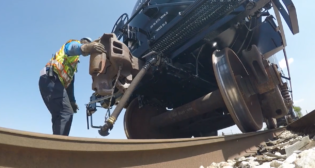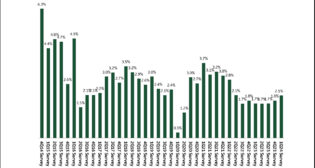
Trinity: “1Q Results Reflect Solid Progress”
Written by Andrew CorselliTrinity Industries, Inc. announced earnings results for the first quarter ended March 31, 2020, which includes total revenues of $615.2 million and earnings from continuing operations per common diluted share (EPS) of $1.33, an increase of $1.09 year-over-year.
In addition, quarterly adjusted EPS was $.11 and excludes $.04 per share related to restructuring activities, $.03 per share related to the early redemption of high coupon debt, and $1.29 per share related to the effects of the Coronavirus Aid, Relief, and Economic Security Act of 2020 (CARES Act).
Other 1Q20 Trinity highlights:
- Cash flow from operations and free cash flow before leasing investment of $174 million and $206 million, respectively.
- Quarterly revenues from leasing and management services of $192.0 million with a 43.0% operating profit margin.
- Growth of the wholly-owned and partially-owned lease fleet to 103,815 units, with lease fleet utilization of 95.4% at quarter-end.
- Rail Products Group quarterly revenues of $509.4 million and a 4.9% operating profit margin.
- Rail Products Group quarterly railcar orders and deliveries of 1,970 and 3,705, respectively, resulting in total railcar backlog of $1.6 billion at quarter-end.
- Repurchases of approximately 1.9 million shares at a cost of $35.4 million.
- Total committed liquidity of $760 million. Potential additional liquidity of $200 million available under corporate revolver, subject to certain conditions.
“As of March 31, 2020, we had total committed liquidity of $759.7 million, which includes $213.2 million of unrestricted cash and cash equivalents, $284.5 million available under our revolving credit facility, and $262.0 million unused and available under the TILC warehouse facility,” Trinity said. “Our revolving credit facility also contains a $200.0 million expansion feature that can be accessed subject to certain conditions. Additionally, as a result of certain provisions of the CARES Act, Trinity anticipates receiving tax refunds in 2020 totaling approximately $303 million, further bolstering the Company’s strong liquidity position.”
“Coming into 2020, Trinity was rapidly and effectively executing on a number of optimization efforts to align with the Company’s go-forward business strategy as well as responding to the decline in railcar demand from the slowing industrial economy in the preceding year,” said Jean Savage, Trinity Industries CEO and President. “Our first quarter results reflect solid progress on a number of actions taken to improve the performance of the business. While we have not lost sight of our longer-term goals, the disruption caused by the coronavirus pandemic is unprecedented, and our first priority is the health and safety of our employees and the residents of the communities in which we live and work. The United States government cited the rail and highway industries as critical infrastructure to our country’s response efforts to this pandemic. I applaud our dedicated employees for their service and commitment to business continuity and keeping critical supply chains operational for essential goods and services to move across North America.
“We expect COVID-19 to have a negative impact on demand for our products and services, clouding our forecasting abilities and limiting visibility into our financial performance for 2020. Trinity’s leadership team has stress tested our business model in several scenarios, and we continue to expect positive cash flow generation from our platform of businesses. Based on our current knowledge and analysis of market conditions, we believe the resiliency of Trinity’s rail platform, solid cash flow generation, and strong liquidity and balance sheet position the Company to withstand the volatile disruption from the global pandemic and take advantage of potential opportunities that can lead to long-term value creation.”
Cowen Insight
The Good
“It appears that the leasing business has thus far been fairly resilient,” said Cowen and Company Managing Director and Railway Age Wall Street Contributing Editor Jason Seidl. “The company has not experienced any significant increase in lease payment delinquencies, and has granted rent payment extensions to a relatively small number of railcar lessees upon a credit review.
“The company canceled 540 energy related railcars from its manufacturing backlog, something that effectively eliminates its exposure to crude oil and frac sand in its manufacturing segment. We believe Trinity has some energy-related units in its leasing segment, but with the aforementioned removal of equipment from the manufacturing backlog, Trinity’s overall percentage exposure to energy is limited (likely in the mid single digits, we believe).
“As a result of certain provisions of the CARES Act, TRN anticipates receiving tax refunds in 2020 totaling about $303 million. The company noted that, as a result of the reinstatement of the tax-loss carryback provisions under the CARES Act, the company recognized a tax benefit of $154.7 million, or $1.29 per share, during the first quarter. The CARES Act includes loss carryback provisions that will allow the company to utilize tax losses generated in recent years (primarily due to accelerated tax depreciation associated with Trinity’s investment in the lease fleet) to recover taxes paid for the 2013-2015 tax years, which were years of elevated company performance.
“1Q20 results were solid. Revenue exceeded expectations, while operating income and EPS were slight misses … At the end of 1Q20, Trinity had total committed liquidity of $759.7 million. The company’s revolving credit facility also contains a $200 million expansion feature that can be accessed subject to certain conditions. Additionally, the aforementioned $303 million tax benefit further boosts liquidity.”
The Bad
“Manufacturing delivery deferments could be very high, posing significant additional risk to our 2020 production estimate of 12.9K units and our manufacturing operating margin estimate of 4.4%,” said Seidl.
The Ugly
“As in the case with most other companies recently, the great market uncertainty associated with the pandemic will likely keep Trinity from providing any specific guidance for a while,” said Seidl.



